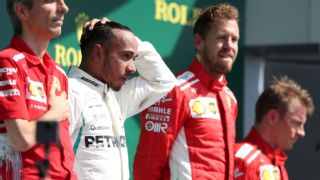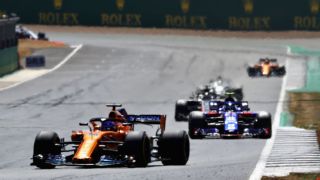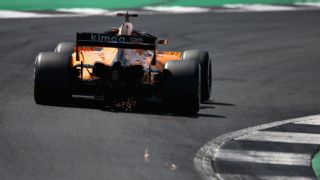|
After F1's historic triple header and entertaining, championship-altering contests in Austria and Great Britain, ESPN's F1 editors Laurence Edmondson and Nate Saunders, and columnists Maurice Hamilton and Kate Walker, weigh in on the biggest talking points after 10 races of the 2018 season. Does Haas need to replace Romain Grosjean? MH: He's proved he's quick. The ability to overcome the trashing his reputation received in 2012 showed he can deal with setbacks. But now he's trying everyone's patience with a succession of incidents. They may not always be his fault, but excellent performances by K-Mag are showing him up even more. Who you'd replace him with is another question entirely... LE: Not mid-season, no. In terms of outright pace he is often as quick or quicker than Kevin Magnussen -- and there's no available driver right now who would be able to match Magnussen coming into the team midway through the year. Grosjean has been hugely unlucky, but his result in Austria proved he is still incredible quick when things go his way. KW: I really like Romain, but it's shades of 2012 all over again. We're not looking at another imminent ban, but the 'first lap nutcase' has reappeared and Romain's really struggling on track. Haas could be doing much better with another driver in the car -- while it's something of a pipe dream, I'd love to see Kimi Raikkonen running alongside K-Mag in the Haas next year. NS: No. Grosjean is a man out of form, but it's important not to forget how big an upside he has. His performances in the years before this one were very impressive and he just needs his confidence back. I would argue he still remains one of the best talents not driving for one of the top three. Has Mercedes cracked under the pressure of Ferrari?  MH: I wouldn't say 'cracked'. But they're certainly under pressure - which is a new experience for a team previously enjoying the breathing space that comes with consistent success. When you're always out front, there is room to try something new and, if it doesn't work, you're still out front. But when the competition is breathing down your neck, that's when things can become edgy compared to before. It's part of racing and Mercedes are coping - just about. LE: In terms of car and engine design, absolutely not. Operationally at the circuit, however, there are some signs of strain. Toto Wolff's comments after the British Grand Prix about Ferrari made the team look desperate at a time when they should have been taking the moral high ground. I still think they are the favourites for the title, but they need to start winning every race at which they have the fastest car. KW: No, but Mercedes are being challenged more than they have been since 2014. In previous years the Mercedes power advantage was such that any weaknesses in the car itself were minimised by the laptime advantage. Now that Ferrari are not only fairly well caught up on the engine front but have also designed a pretty effective car to boot, Mercedes are having to fight on track and on the pitwall in a way they've not needed to before. It should lead to a very interesting second half of the season. NS: I don't think two defeats in a row can be seen as cracking (these thing happen in racing), but the things that have happened away from the track can be. The aura of invincibility has long gone. James Vowles' public apology to Lewis Hamilton during the Austrian Grand Prix was, to quote Christian Horner, bizarre, while the team appeared to forget how to lose gracefully after Sebastian Vettel's win at Silverstone. Mercedes has the car to still emerge victorious this year but for the first time in a long while it looks genuinely ruffled. After the accidents we saw at the weekend, is it dangerous to have a DRS zone through a high-speed corner like Turn 1 at Silverstone?  MH: On the one hand, it's no more 'dangerous' than any other aspect of drivers making a judgement while racing open-wheel cars at high speed. With the ridiculous levels of downforce making almost every fast corner easy-flat these days, it's good have something that offers a challenge. Saying that, I've never liked DRS and it's artificial contribution to racing - and this is an extension of that. LE: Yes, it does have an element of danger, but that is exactly why we need have more of them. Personally, I loved the original DRS system where a driver could use it any point around a qualifying lap. It added extra intrigue: "Will the Ferrari drivers be able to keep it open where the Red Bull drivers can?" As long as the run off areas and barriers can accomodate crashes (and the FIA works hard to esnure that is the case everywhere) we would allow drivers to take more risks. KW: I'm with Charlie Whiting on this one -- it's up to the drivers to decide whether or not to use their DRS, much as it's up to them to determine whether or not it's worth taking a corner flat out. Success on track is about calculated risk -- they can choose how much risk they're comfortable with, and no one is forcing them to take Turn 1 with the DRS open. NS: I'm no fan of DRS, but this was a great use of it. Instead of just allowing one car to breeze past another, as DRS does in most places, this created a genuine 'should I, shouldn't I?' style challenge for the drivers. I'm all for making things more challenging for the guys in the cockpit. With its new leadership, what does McLaren have to do in the remaining races to avoid the season being classed a complete failure?  MH: They're currently seventh in the championship, so it's unlikely to be a complete failure in that sense (compared to, say, Williams). The paradox is these results are solely due to Alonso in a difficult car - but he's not their future. McLaren need to stop trying to appease him, completely abandon distractions such Indy and pitch a few more of the overpaid management duds. The slow and extensive rebuild needs to start now - and be seen to be starting by McLaren's beleaguered workforce. LE: Develop its 2019 car without the aerodynamic failings of the MCL33. Yes, a lot of restructuring needs to take place in Woking, but the team must make sure it still learns all the lessons the 2018 car has to offer. If McLaren can start 2019 with a car performing on track as it does in the wind tunnel, then that will be the first step back to a recovery. KW: Consistently score points, make it into Q3 on a regular basis, and deliver the odd bit of good racing wherever they happen to find themselves on track. No one is expecting wins or podiums, and to finish the championship above seventh would be a good result. Another key measurement will be their relationship with their various partners, and most prominently that with Renault. There's been a regime change since McLared threw Honda under the bus, but the way the team deal with any Renault issues will show whether any of the blame culture remains. NS: The season is already a failure. The team was loudly beating its chest coming into the season about podiums and using 2018 as a springboard for being a contender in 2019, but mid-way through the year its in turmoil. The only thing it can do is ensure everything is in place for the next papaya orange McLaren to live up to the lofty expectations likely to be expected (and publicly declared) by Fernando Alonso. We've heard mixed opinions about the F1 triple header -- does it work as a concept and would you welcome one on another calendar in future?  MH: This should never have been allowed. Those in charge clearly never spoke to the guys on the ground; the ones doing the graft, who barely get to see their young families and who bore the brunt of such a relentless schedule - unlike F1's management who wouldn't know an Economy boarding pass from a doctor's prescription for overcoming stress. LE: I don't think we'll be seeing another triple header. It was introduced to avoid a clash with the World Cup final and accommodate France. A bit more planning in future seasons will see all European races fit into a better-spaced schedule. KW: No no no no no! There is such a thing as too much of a good thing, and the triple-header proved it. After three weeks without a night in my own bed I was sick of the sound and sight of race cars, of conversations about compound choice and tyre deg, of race strategy and all of the rest of it. We're incredibly lucky to do what we do, but it was too much time on the road. Coming home and cooking a meal for the first time in three weeks felt like a real treat. NS: I would not. For a viewer I'm sure it was a great spectacle, with three different winners in three weekends, but the toll it took on individual team members (especially those at the smaller teams with fewer bodies on the ground) has to override everything here.
|
